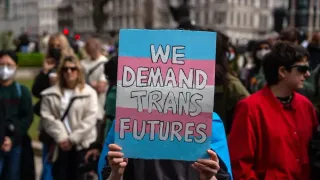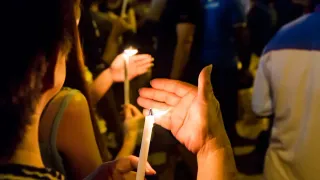
5 hours ago
Queer Activists Plan Cross-Border ‘HIV Kiss-In’ Ahead of World AIDS Day, Spotlighting HIV Stigma and Migrant Rights
READ TIME: 4 MIN.
As World AIDS Day approaches, queer activists are preparing for a landmark event that bridges two nations and multiple intersecting struggles. On November 7, 2025, organizers announced plans for a bold ‘HIV Kiss-In’ demonstration at the U.S.-Mexico border, aiming to shine a spotlight on the experiences of queer migrants and people living with HIV, and to challenge persistent global stigma surrounding the virus .
The ‘HIV Kiss-In’ is designed as a highly visible act of queer solidarity, where participants from both sides of the border will gather and, separated only by the border fence, share symbolic kisses — a public assertion that HIV cannot be transmitted through casual contact and a rejection of the discrimination that still targets people living with HIV today . The organizers have stated that the demonstration is also a protest against restrictive border policies that disproportionately affect LGBTQ+ migrants, many of whom are fleeing persecution or lack access to adequate healthcare .
World AIDS Day, observed annually on December 1, remains a crucial date for raising awareness about the ongoing HIV/AIDS epidemic. Despite medical advances, stigma continues to surround the virus, affecting not only public perception but also the wellbeing and safety of those living with HIV, especially within marginalized communities
The event organizers, in interviews with LGBTQ+ media, highlighted the urgent need to recognize the unique vulnerabilities faced by LGBTQ+ migrants at international borders. According to recent reports by Human Rights Watch and the United Nations, queer migrants—especially transgender women and people living with HIV—face heightened risks of violence, discrimination, and lack of access to critical healthcare during the migration process .
In recent years, the U.S.-Mexico border has become a focal point for LGBTQ+ migration, as individuals flee countries where homophobia, transphobia, and HIV criminalization laws are prevalent. Many seek asylum in the United States or Mexico but encounter systemic barriers, including detention, lack of medical care, and difficulties accessing antiretroviral treatment .
According to event spokespersons quoted by Gayety, the ‘HIV Kiss-In’ aims not only to educate the public on the realities of HIV transmission but also to advocate for humane migration policies that address the needs of queer and HIV-positive migrants . Organizers have coordinated with local AIDS service organizations and migrant outreach groups on both sides of the border to ensure the event is safe and accessible.
“We want the world to see that we are not afraid to love openly, even in the face of laws and borders that try to divide us,” said a lead organizer in an interview with Gayety . The event is expected to draw significant attendance from activists, healthcare workers, and allies from both the U.S. and Mexican sides, with livestreams planned to share the demonstration with a global audience .
International health organizations have consistently warned that stigma remains a major barrier in the fight against HIV/AIDS. According to UNAIDS, approximately 39 million people were living with HIV worldwide in 2023, with marginalized groups—such as LGBTQ+ people, sex workers, and migrants—bearing the brunt of new infections and facing the most significant barriers to care .
Despite medical advances that allow people living with HIV to lead long, healthy lives, misinformation persists. Many people still believe HIV can be transmitted through casual contact, such as kissing, despite decades of scientific evidence to the contrary . The HIV Kiss-In aims to confront these misconceptions head-on, using public demonstration as a tool for education and empowerment.
The Kiss-In’s intersectional approach reflects a growing trend within LGBTQ+ activism to address multiple, overlapping forms of marginalization. The event’s organizers have emphasized that border policies are not just immigration issues but also queer issues, especially when they impact the ability of LGBTQ+ people to access safe environments and lifesaving healthcare .
Advocates point to a rise in anti-LGBTQ+ policies and rhetoric globally, which has led to increased migration of queer individuals seeking asylum . However, the journey itself often exposes them to further risk, including violence, sexual assault, and denial of necessary medical treatment, such as access to antiretroviral therapy for those living with HIV .
Though the immediate focus is on the border region, organizers hope the HIV Kiss-In will prompt broader discussions about the interconnectedness of HIV advocacy, LGBTQ+ rights, and migrant justice worldwide. The event comes at a time when global HIV funding and attention have been uneven, particularly in regions experiencing surges in anti-LGBTQ+ legislation and rhetoric .
LGBTQ+ and HIV advocacy organizations across North America have voiced strong support for the initiative. “This demonstration is a vital reminder that our fights for dignity, health, and freedom are linked,” said a representative from a leading AIDS service organization in a statement to Gayety .
As activists finalize preparations for the HIV Kiss-In, anticipation is building for what many see as a landmark moment in queer and HIV advocacy. The event’s public, unapologetic embrace of love and solidarity seeks to challenge both border walls and the invisible walls of stigma that continue to impact millions worldwide .
Organizers encourage supporters around the world to join in solidarity, whether through attending, watching the livestream, or sharing educational resources about HIV and queer migration. As World AIDS Day nears, the HIV Kiss-In is poised to send a powerful message: that love, dignity, and the right to health know no borders.






